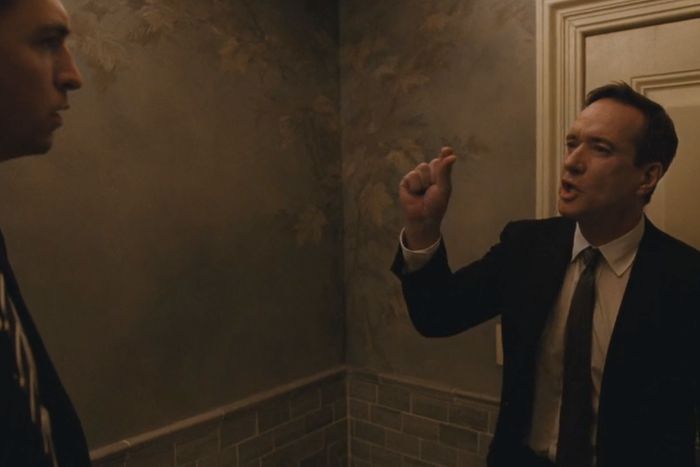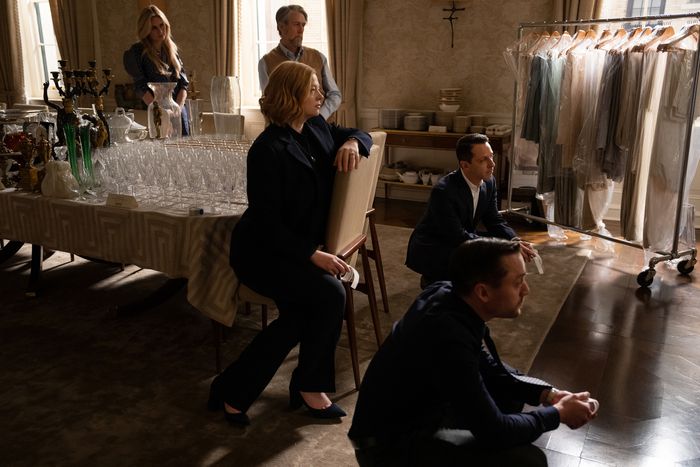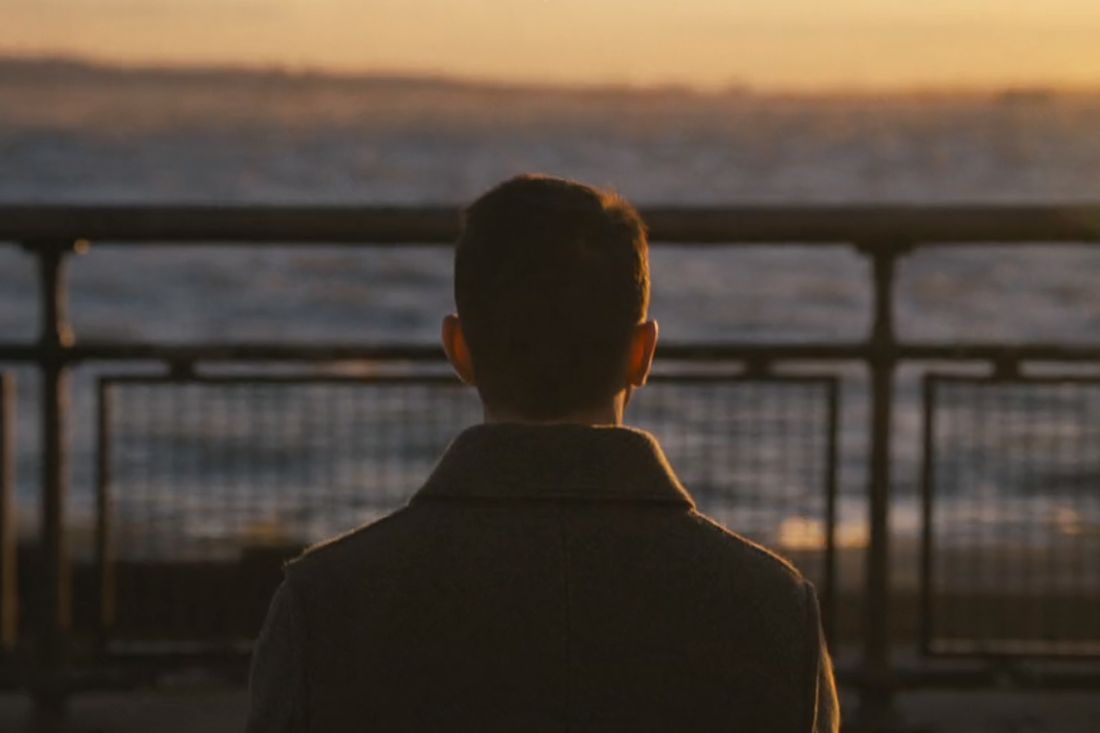
This article was featured in One Great Story, New York’s reading recommendation newsletter. Sign up here to get it nightly.
For a series steeped in excess, Succession ended with modesty. No dream sequences, no art-cinema editing, no jumps forward or backward in time. Just people taking out their issues on other people, who all in turn have their own issues.
The saga comes to a head in the boardroom at Waystar Royco, as Lukas Mattson signs a deal to buy the company after an intense day of tactical maneuvering by the three central Roy siblings, Kendall, Shiv, and Roman. The aftermath is deliberately anticlimactic: just a bunch of guys signing a piece of paper and smiling for news photographers. But it’s preceded by wave after wave of distress and unease, occasional eruptions of emotional violence, and two physical fights. The contrast between the mercurial emotions of the siblings, who take everything personally, and the rest of the company, which finds such displays grotesque if they don’t come from the late Logan Roy, gives the final episode an odd mix of analytical coolness and detached empathy that has always been present but never displayed so outright.
Executive producer and filmmaker Mark Mylod, who has directed more episodes of Succession than anyone else, usually takes the chair for momentous chapters of the series; “With Open Eyes” was the most fraught of all because it would retrospectively frame the show, coloring how viewers remembered it. By focusing on intimate interactions between two, three, or perhaps four characters, putting everyone else in the background, and trying to make both the performances and the visual record of the performances seem as spontaneous as possible, Succession ends with a sense of resignation, though not futility: This is what happened, and here is where the main characters ended up. The audience is left with a shot of Kendall, humiliated and broken again, staring out at New York Harbor. He doesn’t know what to make of it all, and neither do we.
This is not one of those swing-for-the-fences finales where you do something unexpected and surprising like cutting to black or flashing forward to the future under the jackboot of Mencken. It’s just the final chapter in these characters’ stories. Were there any discussions of doing something more radical or disruptive?
We did discuss the nature of the episode, but never as “this is the wrong thing to do.” So much of the episode had to be about moving the three siblings from where they are at the end of episode nine in terms of their power dynamic and their likelihood to succeed in the succession. We had to evolve them to a place where we could get them to the ending that we were always leading toward from day one, and that required a lot of intimate scenes — specifically that whole section we shot in Barbados.
It was only once we were back from there that we could open things and bring in more characters, bring in a little more of the New York scope, and raise the stakes. But everything was almost by necessity and definition a slow boil toward that final boardroom scene. We’ve always tried to stay true to our own values, the emotional truths of the characters, and what we see as what would happen, and we’ve tried to make that dramatically interesting — and also funny sometimes. I don’t know about any of the other possible endings Jesse Armstrong might have entertained.
Did you know from the beginning that none of the siblings were going to get it and that Tom would be installed as a puppet CEO?
Jesse did, I believe. I specifically didn’t ask. I think there’s a danger for actors to know the future, because you can end up unconsciously playing that future on some level. And there’s a danger for me as well. If I know too much, I’m worried I’m going to start skewing that way and giving little pointers, because it’s irresistible on some level.
Let’s start with Barbados. The kitchen scene at the siblings’ mothers’ house might be the only moment in the entire show when I felt like I was watching outtakes. How much of that was scripted, and which elements were spontaneous or invented?
It’s always a hope with something like that that the result would feel like outtakes. It’s a really important scene, because it is the tragedy of hope. We tried to take the audience to a place where they believed these three could have a happy ending.
We had to shoot Barbados last anyway for scheduling reasons, so I made sure the kitchen scene was the very last scene, so that we, the Succession family, could have a happy ending in that scene. It’s really the happiest and the closest we’ve ever seen the Roy siblings. That we could have that kind of moment together was an indulgence, and I love the indulgence.
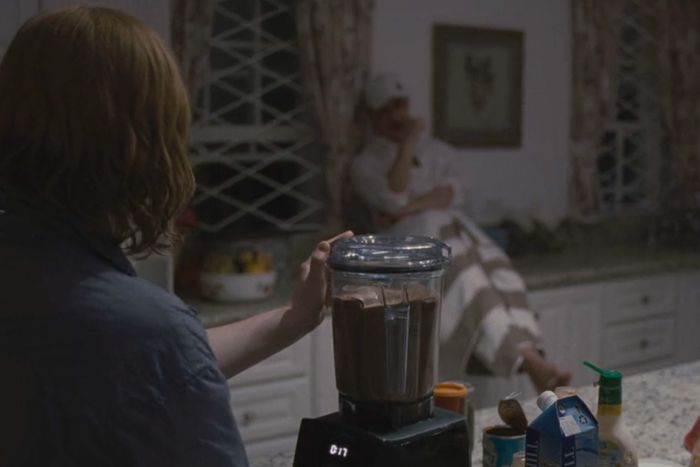
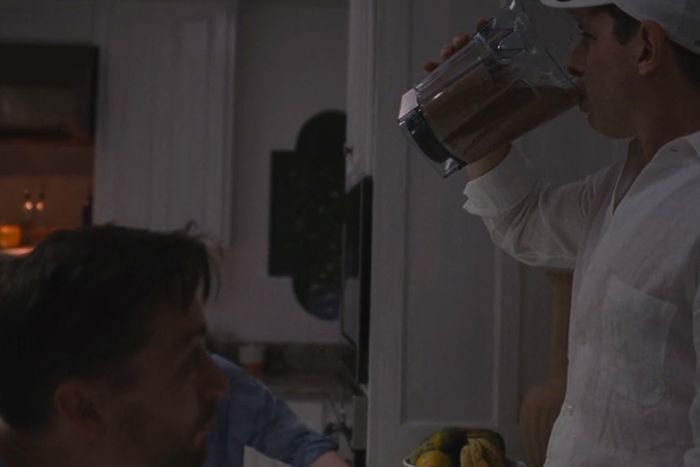
Did the smoothie Jeremy Strong ingested contain Sarah Snook’s spit, or was there a non-spit version prepared by the props department?
Sadly for Jeremy, there were no safe smoothies. We did a lot of takes on that — at least eight, maybe more — where we did a full run, because it happened slightly differently each time, and it felt like we could do pick-up shots. We ran the whole scene from start to finish — including Jeremy drinking it. At a certain point, I gave him the out. I said “Listen, I’ve got you drinking this stuff. You don’t need to drink it anymore,” but by then, he was so deep in the moment that he just couldn’t stop himself! By the time I called “cut,” he would lean over and retch into the kitchen sink. It was so disgusting! The sink in the kitchen was absolutely unbelievable. I’d walk into the kitchen and want to throw up just because of the smell. For some reason, the alchemy of whatever Sarah was putting into that really was disgusting — including her own spit!
What could they have put in that smoothie that Jeremy Strong would not have drunk? I thought he was gonna do the entire thing in one gulp.
I’m not sure there’s anything he wouldn’t have ingested, but I’m not even going to risk a quote about that. I’ll just say that if eating a bull’s heart like Leonardo DiCaprio in The Revenant didn’t do harm, Jeremy would go there too. Jeremy will always go there.
Two acts of violence define the second half of the finale. The first is the scene where Tom charges into the bathroom after learning that Greg has betrayed him and slaps him, and Greg slaps him back. The other is Kendall trying to gouge his brother’s eyes out after Roman makes the remark about his children. Were both of those attacks written into the script? And if so, how meticulously when there’s physical danger involved?
Both instances were scripted — particularly in terms of it being a mutual fight, in that Nick Braun’s character would respond in kind. By that point in their relationship, the power dynamics have evolved somewhat — at least in Greg’s head. He thinks he has a winning hand, that he’s cornered up by playing the card of calling Kendall. And, of course, Tom thinks Greg has sabotaged his chance of winning, because it gives the junior Roys a chance to realign and regroup. He feels he’s had his golden ticket snatched away from him. Greg feels that, actually, he’s at least as strong as Tom in that moment, which turns out to be an absolute fantasy. What the moment represents is the moment a teenager won’t be shouted at by his father anymore without screaming back.
It’s rare that a moment of physical conflict in a movie or TV show seems like a real fight erupting suddenly. These guys fight like adult men who don’t actually know how to fight. But you can sense real and dangerous anger, particularly from Nicholas Braun. That expression after he slaps Tom back, they struggle, then they part — there is a sadness, a fury, and a disappointment on Braun’s face, and that was what made me think, “Did he not expect to get hit?”
That has so much to do with brilliant acting. There’s a great emotional truth to that moment; there’s an element of shame from Greg in the way that, even if it’s an unfocused shame, there’s an emotion that he found — the kind that catches in the back of one’s throat that is yet unrecognized. But it’s still there, and you can feel that in the aftermath as the adrenaline starts to subside. It really helped that Matthew Macfadyen and Nick Braun are huge friends and agreed to properly hit each other to the point where we see the redness in their cheeks from the impact of those slaps. The fact that they were willing to harness the adrenaline that comes from that pain — that was one of the reasons the scene was effective.
How about Kendall attacking Roman outside of the boardroom?
That was probably the only physical altercation we’ve actually done some kind of prestaging on. First, because Sarah was heavily pregnant and we had to protect her, so we talked about parameters going into that. Second, because we know that when Kieran and Jeremy are so deep into the moment, then yeah, it’s gonna get messy.
But there’s huge affection between the two actors, and such a complex relationship that we’ve all evolved, that we know just how far to go without actually punching somebody in the face. That said, sometimes there are real hits going on there that you’ll see in the cut, which are brutal, but both of them knew how to pull the blows just enough so that it hurt but wasn’t gonna leave a mark.
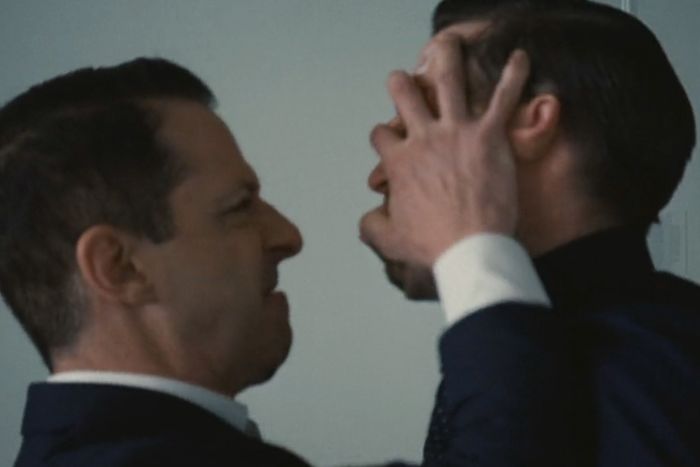
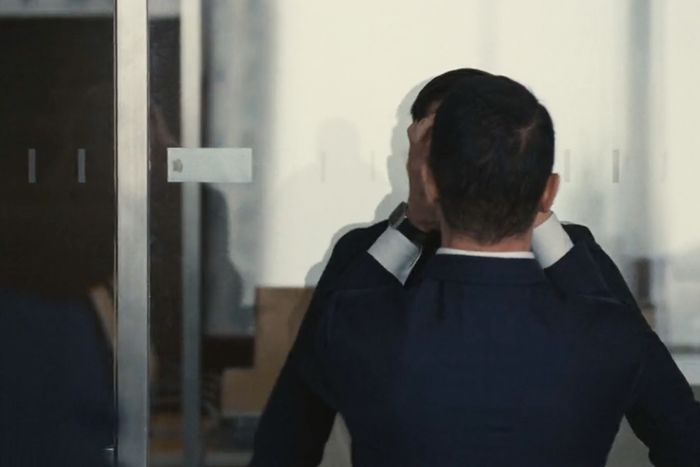
In the staging of that altercation in the office, you keep cutting to the boardroom. How many cameras were covering all of that? Was it all done simultaneously like a three-dimensional play?
Yeah. Unless there’s a really good reason to, I tend to shoot with two cameras 90 percent of the time. The only time I’ve done more than two cameras was at the funeral service and during the half-hour take on the boat.
What was the process?
With that sort of scene, I will generally almost always start close. I want to get the raw first take and all the mistakes that come with that and the camera barely keeping up with the action, and eventually I’ll work the camera out on subsequent takes. Once I know I’ve got the rawness of the performance and the rawness of the scene in close-up, the rest of it becomes about the grammar and humiliation of how public their fight is by pulling the camera back and back through the various glass boxes and into the main boardroom, so that the fight feels as if there’s no way back for those characters.
How many takes total were done of the brothers fighting?
Quite a few but fewer than you’d think. There’s no rule. We go as many times as we need to get the tone of the scene right and to get the amount of coverage we need for the rhythm of the editing. But in that case, they hit it pretty quickly, particularly when the cameras were inside that glass box. They went into that really hard and fast. Our camera team is very efficient. We started to play quickly after that — once I knew we had the rawness and the brutality of it. We started to lob in different ideas: “Maybe Jeremy will go back into the room, and maybe the camera will follow him” and so on.
Do you think Kendall got up off that bench?
It’s a great question. None of us could answer it. But there is a version where he goes and throws himself in New York harbor. I personally think it’s perhaps even worse than that and sadder to think that the character continues to live in the purgatory of the unfulfillment of what he feels is his birthright and destiny — that he just lives in the empty can of that unfulfilled promise and hope, and the emptiness of that experience is like a life sentence. I don’t feel good for any of them. It’s a truly tragic ending.
Tell me about the feeling of gathering so many of these principal cast members together in the same place at the same time, which has happened over and over again.
Some of my favorite scenes are like that. The more characters in the room, the more there is to play with, the more instruments there are. You’ve got so many layers of connection and disconnection. I get so excited that I’m like a greedy child running around and gobbling up the candy of everything these actors are offering me. So when we’re back at Logan Roy’s apartment and, by default, we’ve got the full cast there, because we’re being voyeurs on the dinner party that none of us was invited to with Logan and his gang where they sing “Green Grow the Rushes, O,” we’re tapping into the history of all those characters at once. I have to be very careful in those circumstances so that I don’t start getting whimsical. I have to stay cold and laser-focused on what the story is and not get swept up in the emotion of being with those characters, and those actors, for possibly the last time.
When did you shoot that home-video footage in the run of the show?
We shot that about one hour before we shot the scene of the siblings watching the video. We shot both on the same day, because both were on the soundstage. You know, we only had two sets built for the show: One is the airplane interior; the other is Logan’s downstairs apartment. And because both scenes were shot there, it was a necessity to schedule them on the same day. So we shot the dinner party with Logan and the gang, then we rushed upstairs and co-producer and second-unit director Katrina Whalen did a really fast turnaround with graphics and framing on it once I’d collected the takes and brought the length of the video down within half an hour, so we could play it back for the actors who were supposed to watch it. We made sure the cast didn’t see any of it before we shot the reactions, so that when they walked into that room, they would see it organically and react to it for the first time.
Seeing Logan in mostly good spirits, probably the best we’ve seen for any length of time, was sad for me as a viewer, because of course Kendall, Roman, and Shiv are not there.
Part of the heartbreak of it is that it’s a little bit of a callback to episode nine, to Shiv’s words during her speech of just saying that he kept you away — except when he didn’t. That’s the thing great, big charismatic people do: When their light shines on you, you feel like you’re the only person in the world, and when the gaze turns away, it’s all the harder to be left in the cold again. So there is a sadness to seeing that side of him that his kids so rarely saw and possibly felt excluded from. I don’t think it’s the case that he was monstrous only around them — he was quite a monstrous character for large portions of the story. But all characters, of course, are dimensional, and even Logan had his soft, charismatic, and warm side, so it was lovely to have an instance of that.
Was everything that happened around that table scripted? Or was there latitude for the actors to bring their own bits?
The basic layout was scripted by Jesse, but beyond that, as far as the individual jokes and moments, there was a lot of latitude. The master take was very, very long, because they were having such fun. And just because we already knew the episode was very long, we had to cut it down a lot for the final edit.
When you cut to the reaction shots of the three siblings watching the video, they seem moved not just by the dramatic implications of what they’re seeing but because they’re watching their fellow actors being entertaining.
They were just completely entranced by it. As was I. Because of that quick turnaround, I hadn’t really had a chance to digest it, so when we played the video back for the cast for the first time in that first take — much of which you see in the final cut … Well, I couldn’t say “cut” at the end of it. I was so emotionally affected. I was crying like a child. I found it very poignant.
Did Mencken win the election? You had that stray line in the finale that suggests that there might be a chance he didn’t get it.
I don’t know. When you leave episode eight and into nine, it seems very much like he’s on his way. That was Jesse’s decision to put the line in there. I won’t speak for him and his reasoning. For me, it was because we couldn’t bear the idea of that character walking into power. We had to have some sense of doubt and to reflect the reality that when you’ve got that kind of situation, as with George W. Bush, it tends to be very drawn out in the courts. So this idea that we could resolve it over two, three days after the election felt inaccurate.
This became a Zeitgeist show. There were people who were very excited at how they thought it reflected what was happening in life, and there were other people, of course, who had misgivings, complaints. “Why isn’t it doing more of this? Why isn’t it reflecting this thing that happened?” How does that impact you as an artist, and what do you think of it?
It would be very anodyne or more vanilla if it didn’t stimulate that kind of debate, and the more fervent it is, the more I think it indicates whether, in part, I’ve done my job well.
In terms of how the show is received and how we react to it, I don’t find that helpful. I’m not part of that Zeitgeist conversation. I’ll hear things from friends and colleagues, but I like to stay true to my instincts as a storyteller and director and stay close with Jesse, so we’re on the same page at all times. I don’t find it helpful to get sucked into Twitter or whatever people are saying.
These characters keep shooting themselves in the foot over and over, but in a slightly different part of the foot each time, is what they say.
There are people who want more forward motion, I think.
Most dramas work on the idea of an evolution, of a change, a sense of dramatic progression, and ours does exactly the opposite. The tragedy, and by an odd extension, the alchemy of comedy, comes from stasis. It comes from the tragedy that these four siblings can never escape the gravitational pull of their father despite their best efforts. Every time they try, they fail and find themselves back in the same place, so there is an essential tragedy to that. For our audience to stay with them while they, with a huge degree of futility, try yet another harebrained scheme to escape that gravitational pull, fail yet again, and find themselves exactly back where they started — it doesn’t sound like the most compelling pitch, does it? And yet I suspect that somehow, through the brilliant writing and brilliant acting, we have achieved that.
How do you thread that needle of continuing to surprise people and be fresh but not stray too far from what viewers already know they like and want? Especially when the characters are ultimately a bunch of Wile E. Coyotes who can’t help falling into the canyon?
Isn’t it about hope? Isn’t it hope that the characters will learn in the same way one watches a soccer game? I’m a big soccer fan, and when I watch, I really hope that Liverpool defense will have learned not to get caught on the swift counterattack. This time it’ll be different, and I’ll watch with passion and fervor, then be heartbroken afresh when the defense makes exactly the same mistake again. When you’re invested in the characters, the team, whatever it may be, it’s the classic triumph of hope over experience.
You’ve reminded me of one of my favorite lines from Mad Men, of Dr. Faye talking to Don Draper: “The best predictor of what a person is going to do is what they have done.”
That line — so beautifully put! The trick with that dynamic is obviously to be entertaining enough, enthralling enough, or engaging enough for people to keep taking that ride, and 99 percent of that is the writing.
When you look back over the experience, what are the memories, the moments, the images that will probably be most prominent in your mind?
At the end of season one, I’ll remember the sense of having found the show, at least directorially, when we finished shooting at Eastnor Castle. With the death of Doddy the caterer and everything that went with that, I felt so entwined with the characters, with Shiv and Tom’s relationship, with finding a nuance and a depth and vulnerability that we could dig into.
Another is season two, “Tern Haven.” That episode was just such a joy to shoot — particularly the big dinner-table scene. That was me channeling Robert Altman, whom I just love. It was where I met Will Tracy, and we went on to make The Menu together. The end of the season in Croatia was so special — and the craziness of shooting on that massive yacht.
Season three, Italy: The last two episodes were such an adventure. There was an intensity to getting those last two scenes, and I’m really proud of them.
Season four, I’ll remember the almost panic and anxiety of having to finish something. By that point, we were so close and such a family, and we felt a terrible, terrible sadness along with pride. I’m still in that emotional hangover now.
At the end of it all, do you consider the show more a tragedy or a comedy, and if one over the other, for whom?
Oh, for me it’s an absolute tragedy — the tragedy of these characters being unable to escape the gravitational pull of their family. They’re just haunted. I don’t see any hope for them ever escaping. Thank God it’s funny as all hell, because otherwise it would be too bleak.
This interview has been edited and condensed.



